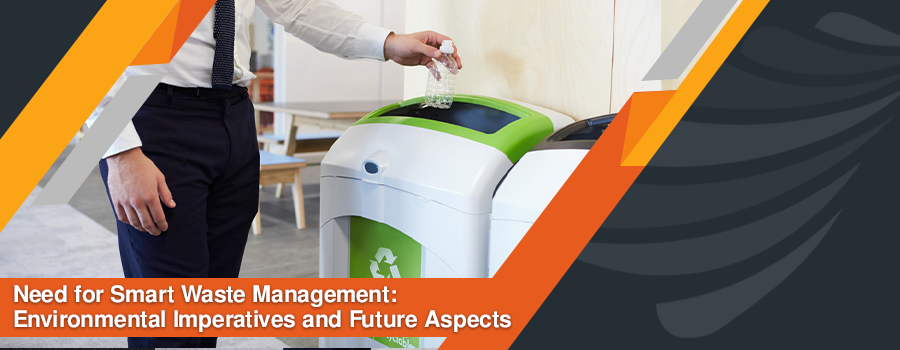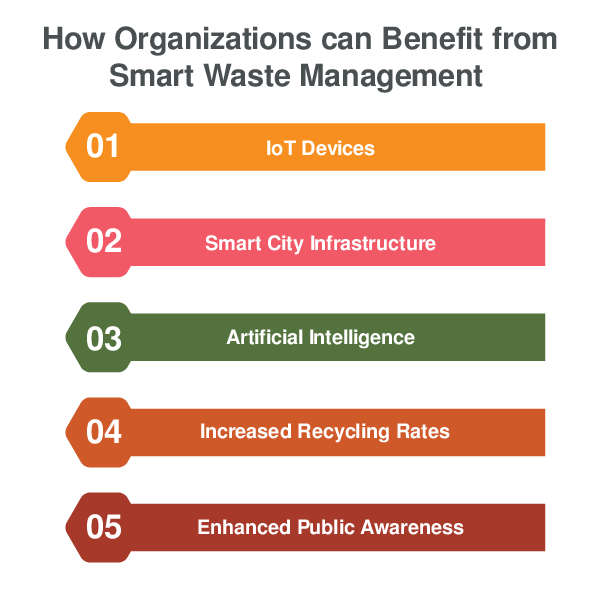Since millions continue to dispose of waste in environmentally damaging ways, inefficient waste management has become a serious global problem. Garbage spills out of containers in densely populated metropolitan areas because of spillage. It endangers not only the environment but also the general public health.
These problems emphasize the requirement for adopting more environmentally friendly waste management techniques, such as smart waste management, to update the waste management infrastructure.
This article discusses the environmental impact of poor waste management, the need for smart waste management, why organizations should adopt it, its benefits to those who embrace it, and its application in the coming time.
The Environmental Impact of Poor Waste Management
Waste management is an area that urgently needs innovation to reduce its environmental impact. The traditional waste collection process is outdated, inefficient, and unsustainable. Smart waste management solutions can help optimize the waste collection process and minimize the negative impact on the environment. By integrating innovative technologies like IoT devices, sensors, and data analytics, waste management can be more efficient, cost-effective, and eco-friendly.
Smart waste management solutions monitor container waste levels and send alerts when they need to be emptied, making waste collection more efficient and reducing the number of garbage trucks on the road. It leads to a reduction in carbon emissions and traffic congestion as well. Furthermore, smart waste management can reduce the amount of waste sent to landfills and increase the recycling rate. Proper waste management practices can also prevent environmental disasters like ocean pollution, floods, and habitat destruction.
Waste disposal is one of the areas of society in which we have taken less innovative initiatives over the last few decades. Usually, the waste collection process involves a garbage truck moving around, collecting waste, and disposing at a landfill. Inefficient routes and planning result in picking up garbage too early or too large, impacting the whole waste management system.
Need for Smart Waste Management
A smart garbage monitoring system is a cutting-edge approach that uses innovative methods and technological advancements to collect, dispose of, and process waste efficiently and sustainably. We use digital technology such as IoT devices, sensors, and analytics to optimize waste collection and disposal while minimizing environmental impact.
One such advancement is Conure BinWise, a smart waste management solution that has revolutionized managing waste. This smart application has eased the burden on waste managers responsible for emptying bins through waste collection trucks on different routes. Using smart fill-level detection sensors, BinWise monitors the waste level in a container and sends alerts when the bin needs to empty.
Implementing the BinWise smart facility allows cities to take data-driven solutions with efficient routes, fewer pickup points, and fewer shifts of waste collection vehicles. It is particularly beneficial for larger cities with high volumes of waste generation. Ultimately, it saves time and money and contributes less to traffic and pollution.
Why Organizations Need to Adopt Smart Technology
Technological adoption is critical to efficient and speedy processing in today’s fast-paced world. Embracing technological advancements allows organizations to streamline their operations, reduce costs, improve customer experience, and ultimately save time. Integrating innovative technologies into business processes makes them smarter, lessens the workload on employees, and contributes to a greener environment. By using technology, businesses can stay ahead of the competition and meet the demands of modern-day consumers.
Adopting technology also enables organizations to provide personalized and innovative solutions that result in high customer satisfaction. It leads to different business opportunities and builds trust among customers and partners. In addition, organizations gain a competitive advantage and contribute positively to the environment by reducing their carbon footprint and implementing sustainable practices.
How Organizations can Benefit from Smart Waste Management
Implementing a smart monitoring system for waste management can bring significant cost savings and environmental benefits to organizations. With advanced technology, companies can optimize waste collection routes, reduce staffing needs, lower landfill fees, and decrease overall waste generation. This approach demonstrates a commitment to environmental sustainability and recycling while enhancing the organization’s reputation among customers and stakeholders.
Moreover, smart city waste management systems can improve employee safety by minimizing the risk of accidents, disease spread, and exposure to hazardous materials. By providing real-time data on waste generation, disposal, and collection, organizations can make informed decisions to optimize the waste management process. We use data to identify areas for improvement and develop strategies to reduce waste output and minimize environmental impact.
Implementing smart industry waste management solutions benefits both the organization and the planet. It helps companies save money, reduce their carbon footprint, and improve sustainability practices while contributing to a cleaner, healthier environment.
Future Aspects
The future scope of smart waste management is immense, and some of the key areas for development are as follows:
IoT Devices
The use of IoT devices in waste management has increased significantly, providing real-time monitoring, data analysis, and improved waste collection and disposal processes. With advanced technological implementation, this trend continues.
Smart City Infrastructure
Smart sensor waste management systems are being integrated into wider smart city infrastructure, allowing better coordination between energy management, transportation, and waste management services. This integration helps to minimize the environmental impact of waste management activities.
Artificial Intelligence
The implication of AI in waste management projects is significant. AI smart waste management can analyze data from different devices, helping waste management authorities identify trends and patterns and make better decisions on waste collection and disposal.
Increased Recycling Rates
Smart waste management using IoT will increase recycling rates by analyzing information on what can and cannot recycle. Automated separation of recyclable and non-recyclable waste will make the process more efficient.
Enhanced Public Awareness
The adoption of smart technology will increase public awareness related to recycling, waste disposal, and management issues. It will encourage the public to contribute positively to reducing greenhouse carbon emissions and pollution. Mobile apps and other tools will develop to help users track their recycling and waste generation activities, improving their practices and education.
Conclusion
Smart waste management transforms trash collection, making it more effective, efficient, sustainable, and environmentally friendly. These smart systems can track, monitor, and optimize waste collection. Increased recycling rates, better public awareness, and a cleaner environment are further advantages. We foresee tremendous investment and innovation in this area in the upcoming years.





